The latest Adam Sandler film, The Ridiculous 6, premieres today, but it's not in theaters. Instead, it's available to stream all over the world on Netflix.
The satirical western, which also stars Taylor Lautner, Steve Buscemi, and Rob Schneider, tells the story of an orphaned outlaw, raised by Native Americans, who discovers that he has five half-brothers. They all go on a rescue mission to find their long lost (and kidnapped) father—hence, the ridiculous six. The film is the first of four exclusive originals Sandler will make for Netflix.
Not everyone loves Sandler, whose name no longer guarantees box office gold the way it did during his Big Daddy heyday. Even before its release, The Ridiculous 6 was labeled racist after a dozen Native American actors walked off the set in April. (Sandler later called the walk-off a "misunderstanding.")
But for Netflix, scoring a big Hollywood name is worth the risks. Sandler detractors aren't likely to cancel Netflix—they just won't watch the movie. And Netflix isn't worried about them anyway. Its biggest goal with the Sandler films is to attract new subscribers beyond the US, where Sandler's brand of humor makes language barriers less of a concern. To reach that audience as efficiently as possible, Netflix has decided it doesn't want to deal with Hollywood. The easiest way to go global, it turns out, is with a film that belongs to Netflix—and Netflix alone.
Netflix is available in more than 60 countries, and the company says it has upward of 24 million international subscribers (it has 66 million in all). But while Netflix may hope to offer the same shows and films to everyone, the entertainment industry traditionally hasn't worked that way. Instead, it's segregated into local markets. That's why, for example, you might see a film in theaters in the United States months ahead of when you could see it in theaters in France.
For Netflix, that arrangement makes little sense. It would rather have everything available everywhere. But Netflix is up against powerful studios and networks with their own way of doing things.
“We’re embarking on something that is fairly new in terms of the media space, global licensing and programming,” Ted Sarandos, Netflix's chief content officer, said earlier this week at the UBS Media Conference in New York. “I don’t know whether it’s more difficult than expected, but it’s not been an easy road because all of the studios and networks have situated themselves to be regional sellers.”
There are other challenges for the company, as well. Licensing deals are expensive, and Netflix doesn't get access to films or TV shows until months (or even years) after they've been in theaters or on TV. Most movies on Netflix are at minimum available 10 months after their theatrical release, Sarandos said. That means many viewers already have seen the films, or just aren't interested after the hype wears off.
If you want it done right, the saying goes, you have to do it yourself. That's exactly what Netflix is doing. It has found great success with original TV shows, from House of Cards to Orange is the New Black. With a portion of its hefty $5 billion budget for original content in 2016, the company is looking to do the same with original films instead of navigating expensive global licensing deals.
Sarandos says that even though critics might pay more attention to its television shows, one-third of viewing on Netflix is movies, even though, he says, "our movies are old." Instead of spending another $1 billion on Hollywood's movies, he says, Netflix decided it should spend that money on its own.
Among those, the company is currently filming War Machine with Brad Pitt and will soon release the much-awaited sequel to Crouching Tiger, Hidden Dragon. In all, Sarandos says Netflix has 10 movies in production and many more planned.
Every movie isn't equal, and, for Netflix, every investment may not end up being worthwhile. But for its "global originals" strategy to work, Netflix must have at least some blockbusters to attract new audiences and keep longtime subscribers happy enough to stick around.
Which makes Sandler a fraught choice. While his name was synonymous with "blockbuster" in the '90s and early aughts, his recent films have stumbled domestically, including Blended and Pixels. Internationally, however, the films were more successful. But whether Sandler can take full credit isn't clear. "The international audience in general is growing, not just with Adam Sandler," says BoxOffice.com senior analyst Shawn Robbins.
Netflix maintains that Sandler's slapsitck has the international appeal to make a four-film deal a worthy investment—and that it has the data to back that claim up. “He is one of the most bankable, dependable stars on Netflix around the world,” Sarandos said earlier this week. Any Sandler movie from the last 20 years immediately make the top 10 in any country when Netflix makes it available, he said.
Sarandos adds that Blended was one of the biggest films in Venezuela’s history—and that Sandler sees enormous success at the box office in Mexico and Brazil. “He’s hugely popular and just emerging in Latin America,” Sarandos said. “Remember, we are a global company. We are looking at him as if he is a global superstar.”
https://www.youtube.com/watch?v=qUp7Qgimn38

